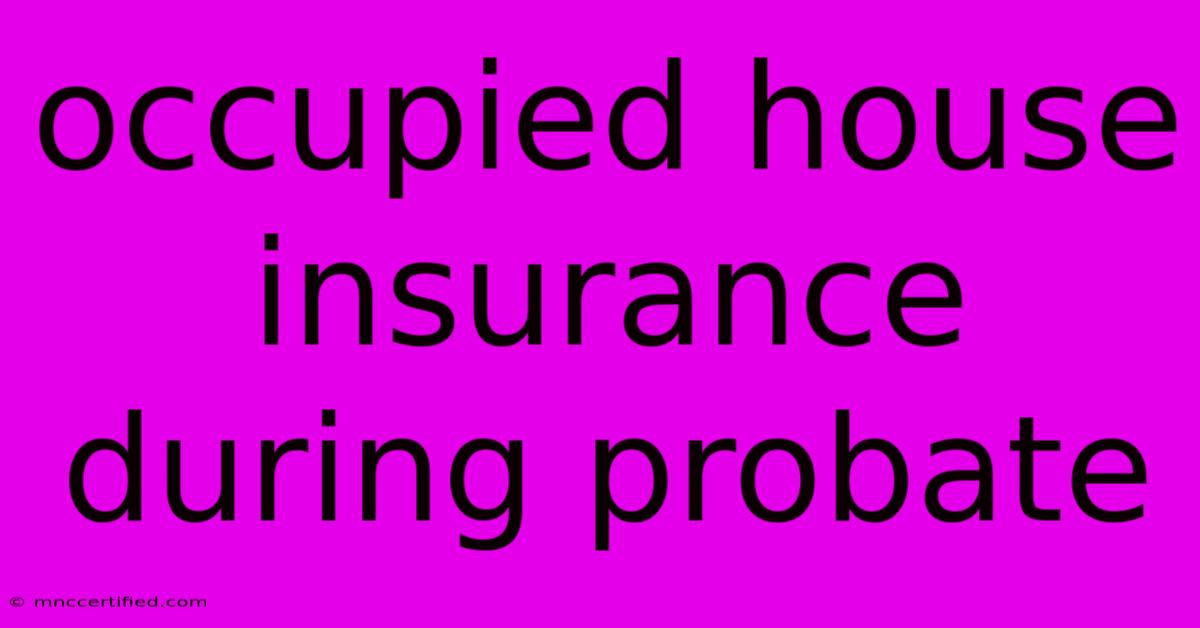Occupied House Insurance During Probate

Table of Contents
Navigating the Complexities of Occupied House Insurance During Probate
Probate, the legal process of settling an estate after someone passes away, can be a long and complicated process. This is especially true when an occupied house is part of the estate. While many aspects of probate can be confusing, obtaining adequate occupied house insurance is crucial during this time. This article will guide you through the intricacies of occupied house insurance during probate, clarifying its importance and outlining key steps to ensure proper coverage.
Understanding the Need for Occupied House Insurance During Probate
The probate process often extends beyond the immediate aftermath of a death, potentially lasting several months or even years. During this period, the house may remain occupied, whether by the deceased's surviving spouse, family members, or even renters. This occupancy brings with it specific risks that necessitate insurance coverage.
Here's why occupied house insurance is vital during probate:
- Liability: The house, while in probate, remains legally owned by the deceased's estate. This means the estate is responsible for any liability arising from accidents or injuries occurring on the property, even if the property is occupied by a family member.
- Damage: The house remains susceptible to various forms of damage, including fire, theft, vandalism, and weather-related events. Probate delays can complicate repair and rebuilding efforts if adequate insurance isn't in place.
- Legal Requirements: Some probate courts may require proof of insurance for occupied properties as part of the estate management process.
Key Considerations When Securing Insurance
Obtaining the right occupied house insurance policy during probate requires attention to several crucial factors:
- Coverage: Ensure the policy adequately covers potential liabilities, property damage, and any other relevant risks, including:
- Personal liability coverage: Protects against claims from injuries or property damage caused by residents or visitors.
- Property coverage: Covers the dwelling's structure and its contents against various perils.
- Additional living expenses: Covers temporary living expenses if the house becomes uninhabitable due to covered events.
- Coverage Amount: Determine the appropriate level of coverage for the house's value and potential liabilities.
- Named Insured: The policy should clearly list the deceased's estate as the named insured, ensuring coverage for the house while in probate.
- Premium Costs: Compare quotes from different insurance providers to find a policy that offers the necessary coverage at a reasonable price.
Steps for Acquiring Occupied House Insurance During Probate
- Gather Estate Documentation: Obtain the necessary documents for the probate process, including the death certificate and any existing insurance policies.
- Contact Insurance Providers: Reach out to insurance companies that offer probate insurance or standard homeowner's insurance policies that can be modified to cover occupied properties in probate.
- Disclose Probate Status: Clearly inform insurance providers that the house is in probate and that the estate is the named insured.
- Review and Compare Quotes: Carefully review quotes from different providers to ensure you understand the coverage details, premiums, and any exclusions.
- Secure the Policy: Select the policy that best meets your needs and finalize the application process.
Maintaining Coverage During Probate
- Regular Communication: Stay in contact with your insurance provider throughout the probate process to inform them of any changes in occupancy, ownership, or any significant events that might affect the policy.
- Promptly Report Claims: If a covered event occurs, file a claim promptly to ensure timely assistance and processing.
Conclusion
Securing occupied house insurance during probate is essential for safeguarding the estate's assets and protecting the interests of all involved parties. By understanding the importance of coverage, considering crucial factors, and following the outlined steps, you can obtain the necessary protection during this challenging period. Remember, seeking guidance from a legal professional and a trusted insurance advisor can help navigate the complex legal and financial aspects of probate, ensuring a smoother and more secure process.

Thank you for visiting our website wich cover about Occupied House Insurance During Probate. We hope the information provided has been useful to you. Feel free to contact us if you have any questions or need further assistance. See you next time and dont miss to bookmark.
Featured Posts
-
Susie Wiles Key Figure In Trumps Win
Nov 08, 2024
-
Possible Septa Strike What To Expect
Nov 08, 2024
-
Top Concert Tickets Deftones Noah Kahan Incubus
Nov 08, 2024
-
Scissor Sisters Pre Sale Uk Tour Tickets
Nov 08, 2024
-
Trumps Strategist Susie Wiles A Closer Look
Nov 08, 2024